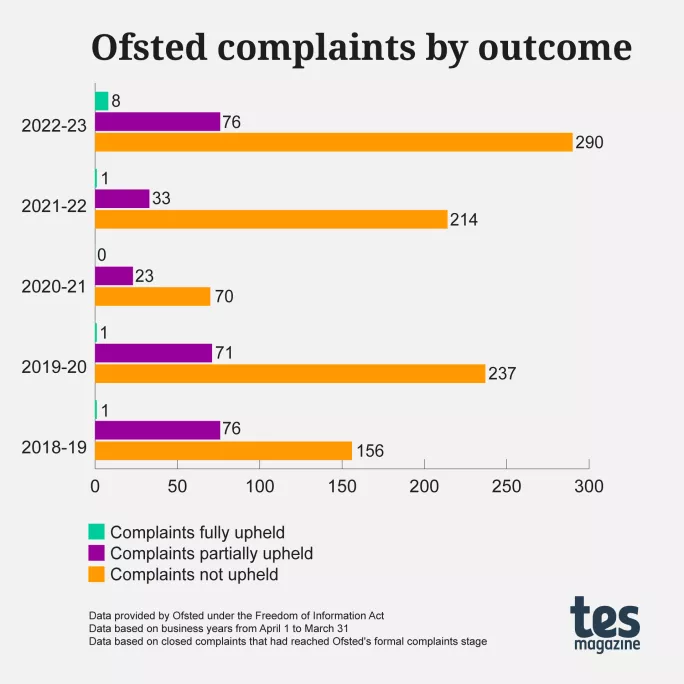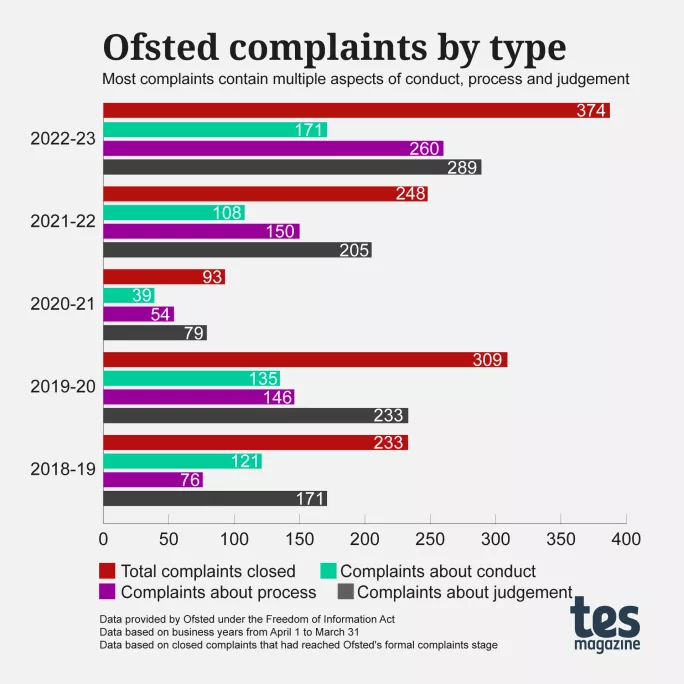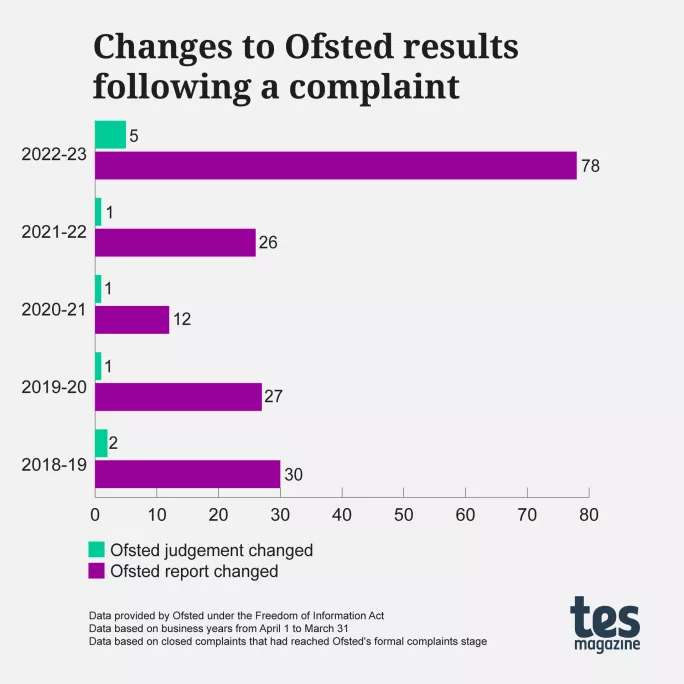Sharp rise in Ofsted reports changed after school complaints

There has been a sharp increase in the proportion of Ofsted school inspection reports that are changed following formal complaints, new analysis of data has shown.
Figures obtained by Tes show that one in five formal complaints in 2022-23 resulted in some change being made to a school report. This is significantly higher than for any of the previous four years.
In 2022-23, there were 78 reports changed - 20.8 per cent of the complaints lodged. The next highest figure over the previous four years was 12.9 per cent in 2020-21.
There has also been a marked increase in the number of complaints that have been fully upheld.
The figures come at a time when Ofsted has faced mounting criticism over its response to complaints. This has resulted in plans for a shake-up of its complaints process, for which a consultation closed last week.
While the data could be taken as a sign that Ofsted has been acting on feedback from schools, headteachers’ leaders point to an increase in complaints overall, and the fact that judgements still remain unchanged in the vast majority of cases.
- News: Ofsted: 4 in 10 senior inspectors have never been a head
- More: Ofsted withholding inspector notes makes it harder for schools to complain
- Background: Ofsted consults on changing its complaints process
- Heads: ASCL warns a review of complaints won’t restore heads’ confidence
Ofsted closed 374 complaints last year, more than in any of the previous four years - although the Covid pandemic affected the number of inspections that took place in 2021-22, 2020-21 and, to a lesser extent, 2019-20. In 2018-19, Ofsted closed 233 cases.

The number of complaints dealt with represents only a small percentage of Ofsted’s overall school inspections. In 2022-23, it carried out more than 5,700 state school inspections in England.
However, leaders said the growing number of formal complaints was a concern.
Geoff Barton, general secretary of the Association of School and College Leaders, said: “The growing number of complaints only exacerbates the feeling that Ofsted is losing the trust of the profession.”
The union is ”regularly” told by school and college leaders that they find it “very hard” to successfully challenge the result of an inspection, said Mr Barton, adding that Tes’ data “shows that that is overwhelmingly the case”.
Ofsted ‘compartmentalising the complaints’
There were five schools last year whose inspection grade changed. Although this is as many as in the previous four years combined, it still represents only 1.3 per cent of the formal complaints about inspection made by schools.
And most complaints are still being rejected by the inspectorate, the figures show.
Of 374 formal complaints from schools about their inspection in 2022-23, eight were fully upheld and another 76 were partially upheld. However, 290 - over 77 per cent - were rejected.
Frank Norris, education adviser for the Northern Powerhouse Partnership and formerly an Ofsted director and a multi-academy trust leader, said: “If you look at the numbers, there are eight upheld, 76 partially upheld but only five where the grade changed. That feels significant to me.
“Ofsted is compartmentalising the complaints by conceding that a change was needed. It can characterise this as a small change to the report and say it has been dealt with, but it could have been something that went wrong with the inspection which changed the whole experience of the inspection for the school’s staff.”
There is also a concern that, in some cases, schools struggle to submit complaints in the first place.
Earlier this year, Tes revealed how Ofsted’s refusal to disclose seven in 10 requests for inspectors’ evidence was undermining schools’ abilities to launch complaints.
Complaints about inspection ‘process’ are rising
The Ofsted data provides a breakdown of the number of complaints relating to three areas: the conduct of inspectors; the inspection process itself; and the judgements that inspectors made. Ofsted said that most complaints were about more than one of these areas.

In 2018-19, the last full year under Ofsted’s previous school inspection framework, complaints about process accounted for 32.6 per cent of the formal complaints that were closed.
Since then, this figure has increased year on year to 69.5 per cent in 2022-23.
Tes has reported extensively on leaders’ frustration with the way some inspections are carried out, and today highlights concern that too few HMI have the insight gained from headship experience to make reliable judgements.
School leaders are particularly concerned that the inspection framework allows for overly subjective judgements to be made, that the quality of inspection teams is too variable and that inspection activity sometimes goes beyond that set out in the handbook.
The figures obtained by Tes show that complaints about inspectors’ conduct were included in 45.7 per cent of cases in 2022-23 - higher than in any of the previous three years but lower than in 2018-19, when it was included in 51.9 per cent of complaints.

The number of fully upheld complaints in 2022-23 (eight) is higher than in the previous four years put together (in which there were a total of three).
The data is broken down by business years from 1 April 1 to 31 March, and covers the past five years back to 2018-19.
It relates to cases lodged as formal complaints by schools unhappy with some aspect of their inspection or by a third party unhappy with a school inspection, and which were closed by Ofsted.
Ian Hartwright, head of policy at school leaders’ union the NAHT, said the figures showed the need for “urgent reform”.
He said: “The rising number of complaints bears witness to a faulty inspection framework which inspectors routinely struggle to complete in the time available and which views all schools through a secondary lens.
“Too often, school leaders talk of being cut off when presenting evidence, or findings being made on partial, incomplete or insecure evidence.
“Undoubtedly, this has led to more complaints.”
Ofsted was approached for comment.
You need a Tes subscription to read this article
Subscribe now to read this article and get other subscriber-only content:
- Unlimited access to all Tes magazine content
- Exclusive subscriber-only stories
- Award-winning email newsletters
Already a subscriber? Log in
You need a subscription to read this article
Subscribe now to read this article and get other subscriber-only content, including:
- Unlimited access to all Tes magazine content
- Exclusive subscriber-only stories
- Award-winning email newsletters
topics in this article



